Jersey Builders for Refugees were officially recognised as a charity last week and since then have raised £5,000 through corporate sponsorship.
Their aim is to initially raise around £65,000 so they can buy and assemble 48 potentially life-saving shelters from the UN-backed Ikea Foundation that could house nearly 1,000 refugees and migrants in Calais’ Jungle camp.
Last month the JEP reported that yachtsman Mike de Petrovsky had donated his seven-berth vessel to the group and that Ghazi Najib, a member of the charity, intended to raffle it to raise around £50,000.
However, after conversations with Jersey’s Gambling Commission, the charity have had to pull the idea after they were told it is not legal for them to set a minimum number of tickets that need to be sold.
Instead they are now trying to sell the vessel for £25,000 and say all proceeds will go towards housing some of the most vulnerable refugees and migrants.
‘We are saying £25,000 for the boat. It is a great boat and the motor on it has only done 50 hours,’ said Mr de Petrovsky.
‘It is going to be cold in Calais this winter, so the quicker we get the money the better.’
The charity hope to soon put a £5,000 deposit down on 48 shelters, which come in flat-pack form each with their own solar panels, and begin assembling them in Calais in the New Year.
Evan Smith, who helped start Jersey Builders for Refugees with Mr Najib, added that they now intend to approach approach the Jersey Overseas Aid Commission for financial support as well as the States.
The charity, which will shortly launch a Just Giving page to raise more money, will have a stall outside BHS on King Street explaining what they do this today.
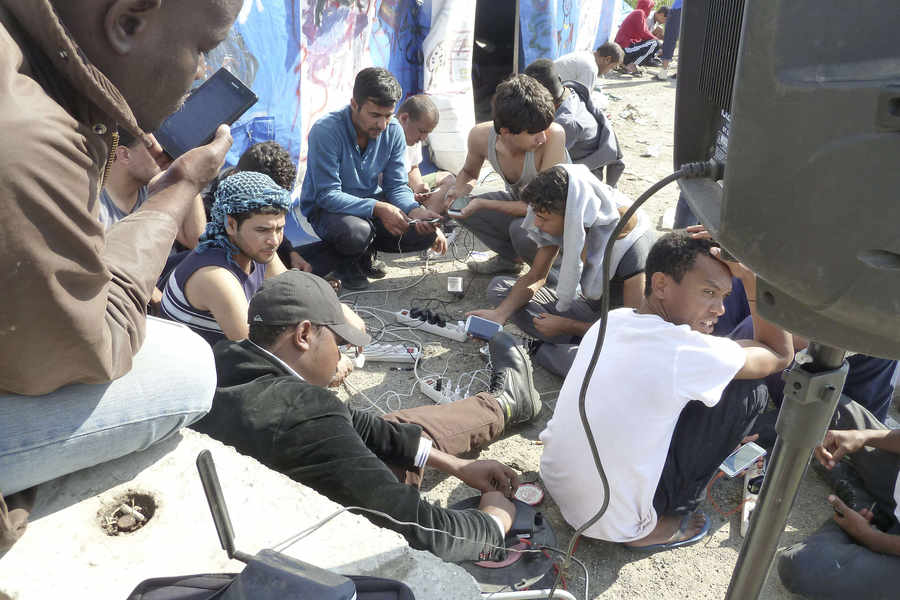
THERE are more than 3,500 migrants living in a makeshift camp called the Jungle outside Calais – but what is life really like there?
JEP reporter Ian Heath visited the camp in September 2014 with aid worker Sophie Renouard and pilot Kat Tiefenthal, who were delivering much-needed supplies.
He found that like anywhere else, there are good people and bad people within the community.
Hope exists, with schools, shops and restaurants being built within the camp. But amid the positivity there are disturbing reports of violence, prostitution and rape.
THE Jungle is a slum. There are piles of rubbish everywhere, there’s little sanitation, a lack of food and disease is starting to spread. It’s a mess.
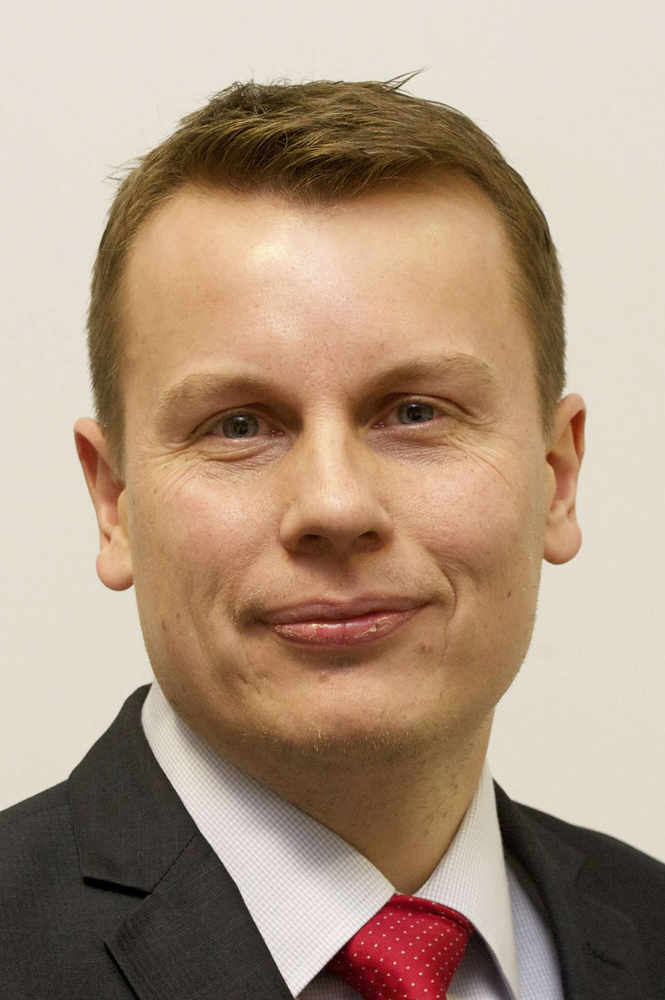
Flooding following the recent rains has destroyed some of the camp – a large tent on the outskirts has been ripped apart and replaced by a large pool of water.
Young men huddle together in makeshift sheds when they wish to sleep and the campsite is filled with an almost endless sprawl of second-hand tents.
The men also congregate around the scarce hubs where they can charge their mobile phones or electrical devices and the few points where they can collect safe, clean water.
Migrants from different countries gravitate towards each other in different sections of the camp – there’s a Sudanese section, an Eritrean section, a Kuwaiti section, a Syrian section.
I was told the national make-up of the camp is about 35 per cent Sudanese, 30 per cent from Afghanistan, Pakistan, Iran and Iraq, 25 per cent from Eritrea, Ethiopia and Somalia, 5 per cent Syrians and 5 per cent from North Africa, with a handful of eastern Europeans.
Most of the camp occupants are young men in their twenties and a lot of people have questioned why the camp is populated with fit, young men and virtually nobody else.
But the Jungle isn’t a place for families. Life is difficult in the camp and it is hard getting there in the first place.
After speaking to several migrants, I learn that many of them have left their families behind because it was too dangerous or too expensive for them to come with them.
The ‘fit young men’ have come to Calais because they can cope with the tough conditions, and stick it out to try to find a new life in France or Britain.
Many people have also questioned whether the occupants of the camp are economic migrants or refugees – the answer is both.
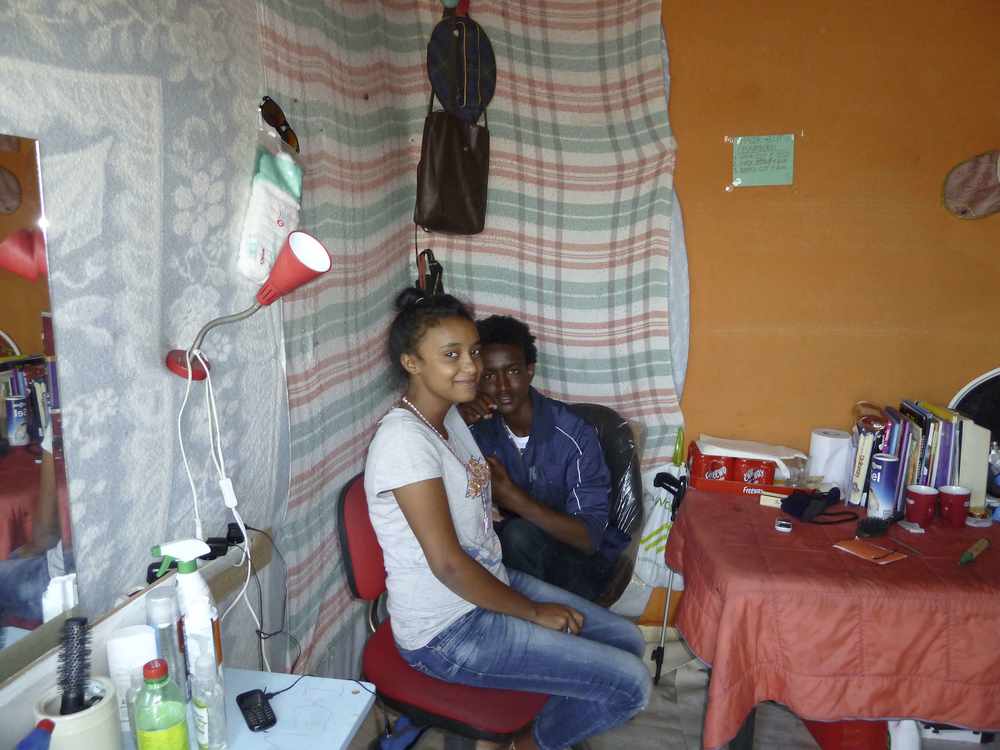
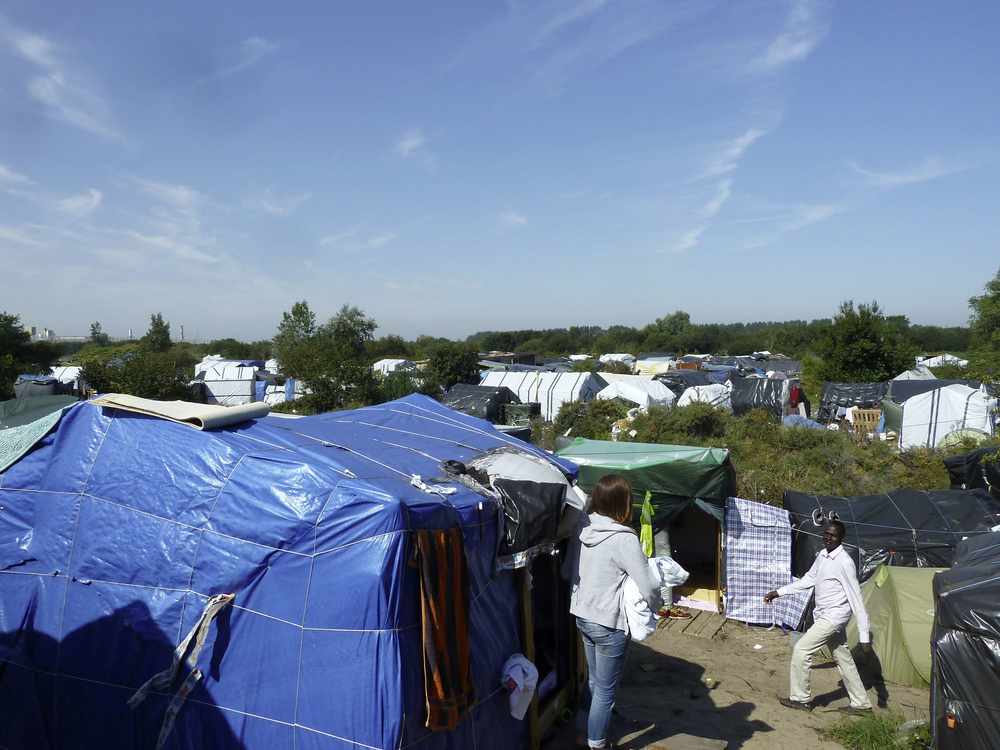
Some have fled war and oppression to find somewhere to live safely and in peace while others are seeking the better opportunities that Western Europe has to offer compared to their home countries.
Tensions can run high at times in the camp and there were reports during my visit that fights had broken out the night before over resources. Meanwhile, Europeans dropping off aid in their cars have been overrun by migrants.
I also learn that some of the shrewder migrants are stockpiling goods and selling them on to new entrants to the Jungle.
The camp has become something of a mini city, with makeshift schools, shops, restaurants and even a hairdressers springing up. Different communities seem to have emerged and some of the migrants are demonstrating their entrepreneurial skills, setting up businesses in even the most basic conditions.
Many of the migrants have paid upwards of $6,000 to make it to Europe, paying smugglers to transport them across the Mediterranean. Some, however, told me that they got across the sea for free.
I was told by an aid worker that 30 per cent of the migrants want to live in France, and the rest want to move to Britain where it is perceived as easier to find employment – including illegally – and where they believe they will face less racial discrimination.
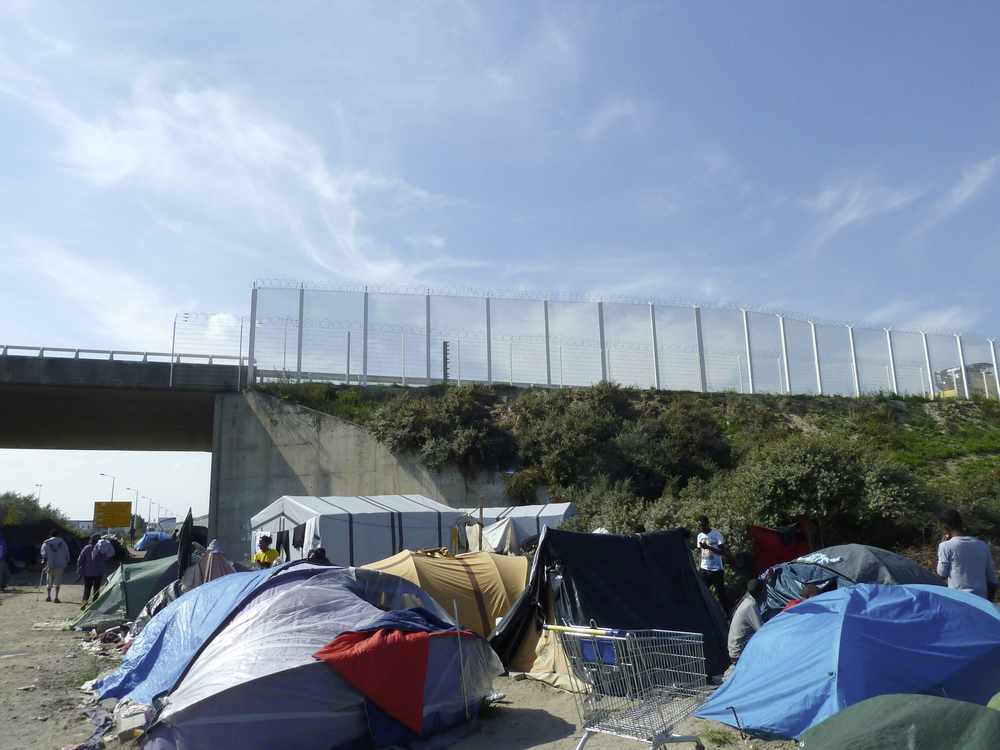
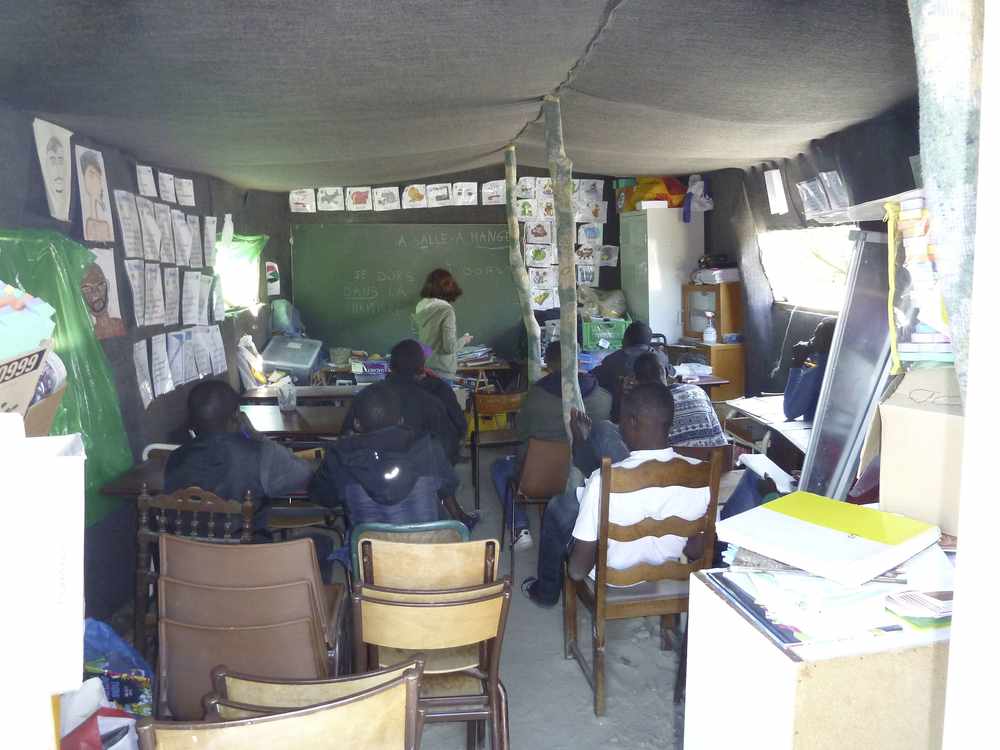
A women’s refuge has been set up in the Jungle but it is full to capacity and is having to turn back women seeking shelter. There are reports of rapes and prostitution within the male-dominated camp.
I was told that about 1,500 migrants have made it to Britain through stowing away in cross-Channel traffic and there are about 30 to 50 more migrants coming into the camp every day.
Another aid worker told me that many of the men in the Jungle have cuts and bruises from trying to climb over a fence, which was erected around the nearby motorway by the UK government, as they try and jump onto lorries heading for Dover.
The Jungle is not going away any time soon and winter is coming, with its harsher conditions. There will be a high death toll unless people have shelter and insulation to get them through the colder months.
Aid agencies, including the Jersey Calais Refugee Aid Group, are calling for help as they look to build winter shelters in the camp.
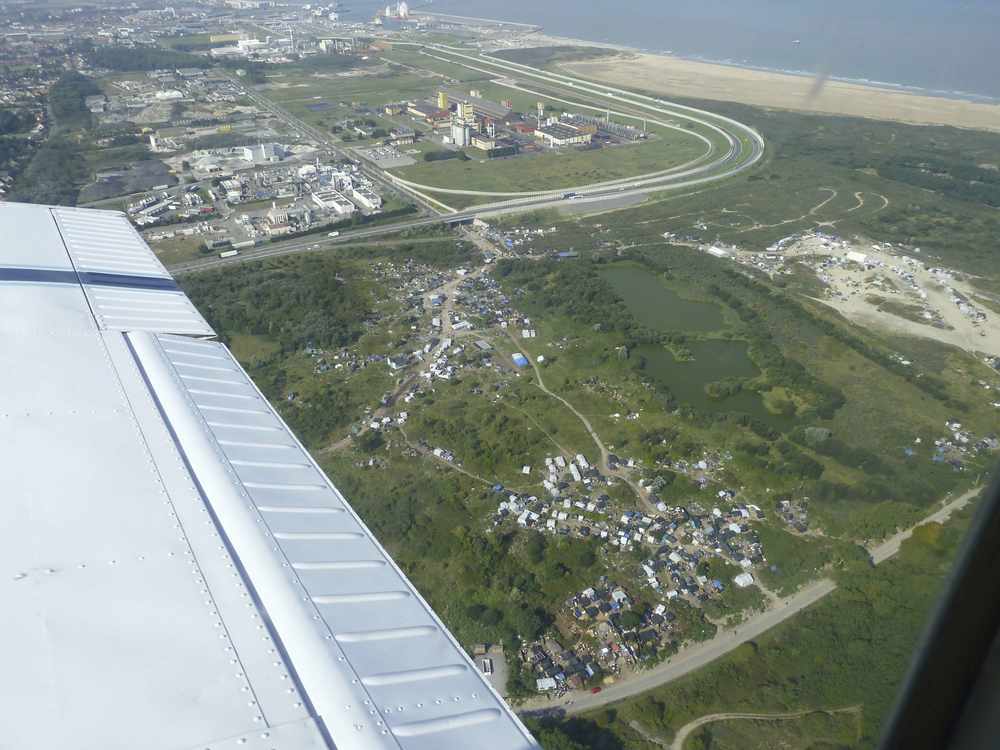
L’Auberge des Migrants
A French-based aid agency has called on Jersey donors to help provide building materials and volunteers to construct winter shelters in the Jungle.
During their relief work, JCRAG have formed links with Francois Guennoc of relief organisation l’Auberge des Migrants, who has warned that better shelter is now needed for the migrants as the winter months approach.
He said: ‘For the last four weeks we have received five to ten cars or vans every day of tents, blankets and clothes, but now I think it is probably enough for the winter, with the exception of big tents and shoes – which are still needed.
‘Now we must think of how to shelter people for the winter – half of the people here are in tents, which are not insulated. They are in a windy country as well, so we need to build something better.
‘They built a shelter for 1,000 people and we must organise a similar operation in October.’
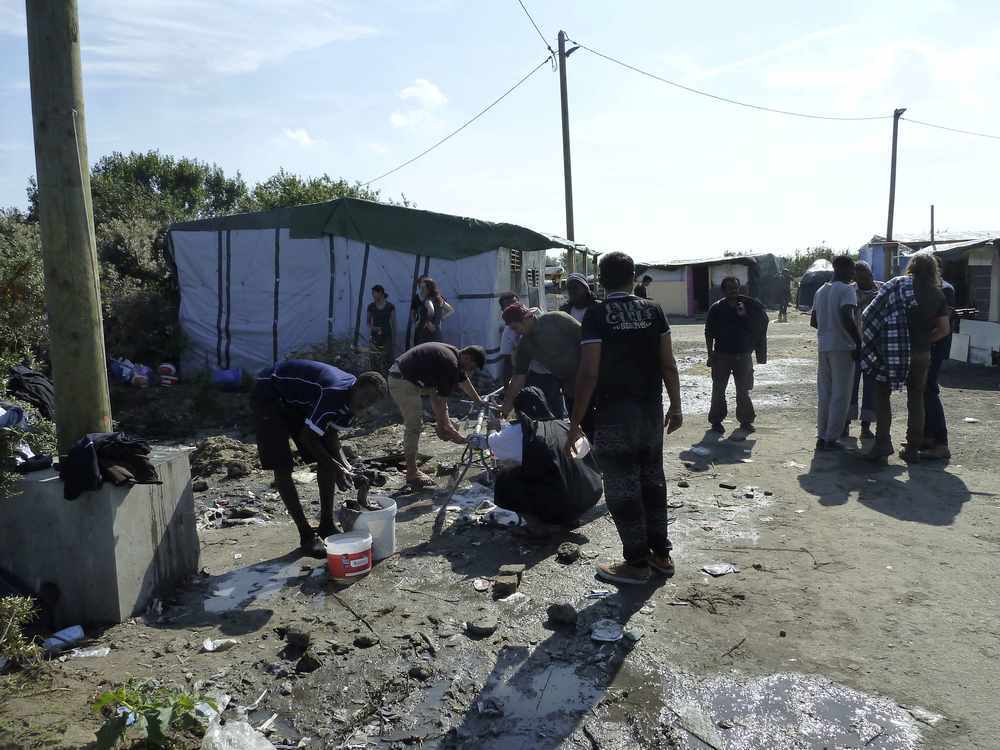
He said that the best way for donors to help would be to send money so that they could buy materials in France, and he also called on volunteers to come to the camp to help build the new shelters.
‘If they can spare a week or two of their time to help us build, we need to build structures in late September or early October,’ he said.
He warned people not to deliver any kind of donations personally, however, saying that the expertise of the aid agencies was required for the distribution to the migrants.
There have been reports of aid being delivered personally in cars directly to the camp, which have then been overrun with migrants trying to get hold of supplies.
Mr Guennoc explained how the numbers of migrants had swelled dramatically since he started working for l’Auberge des Migrants.
He said: ‘When I started there were about 300 migrants in the camp, but by the spring this year the number had increased to 3,000.
‘In June, they started trying to break into the Channel Tunnel and the number decreased, as about half of them, I think, made it to the UK.
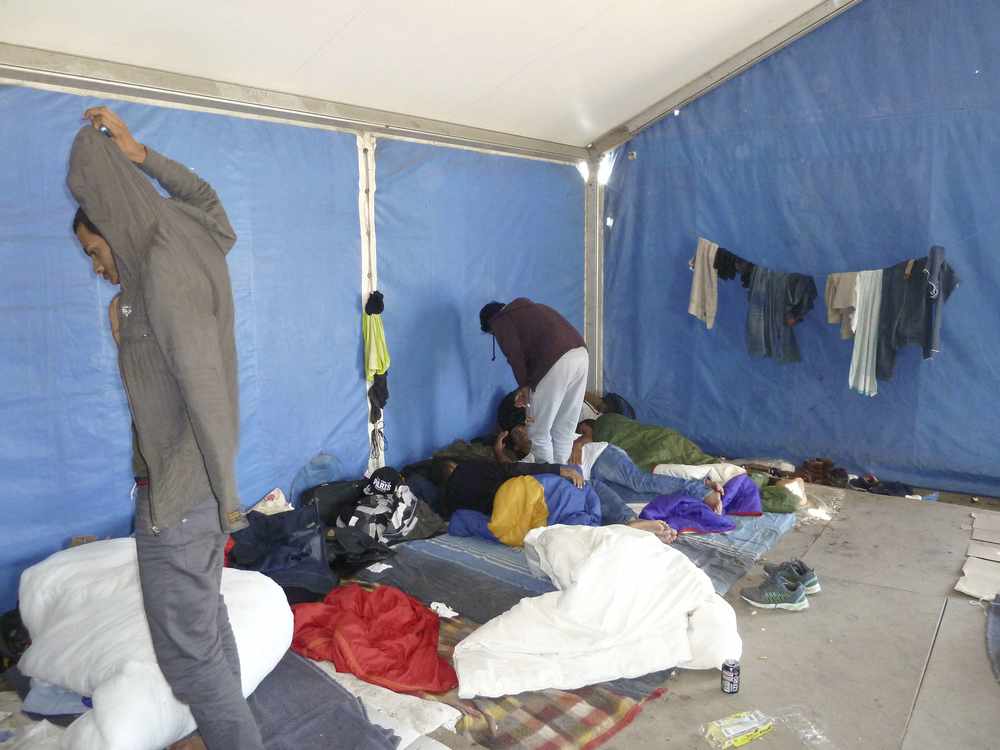
‘But then they put the fences up, and there were more police, more dogs, so it became much more difficult for them to cross.
‘More have come again and we think there are about 3,500 now, with about 50 coming every day.
‘By the end of September, we think there will be about 4,000, but the number coming will decrease from October, when the weather conditions will be too bad for them to cross the Mediterranean.’
Chief Minister Ian Gorst was due to meet with Bram Wanrooij and Sophie Renouard today to discuss how Jersey could help with the migrant crisis.
Senator Gorst has said that Jersey is looking into accepting some refugees from Syria into the Island. The move followed an announcement from UK Prime Minister David Cameron, who said that Britain would accept 20,000 refugees from camps on the Syrian border over five years. He added that the number was likely to rise.
For more information on the Jersey Calais Refugee Aid Group, visit their Facebook page, which contains details of how to donate and help the cause.
Information on l’Auberge des Migrants can be found at laubergedesmigrants.fr or their Facebook page.
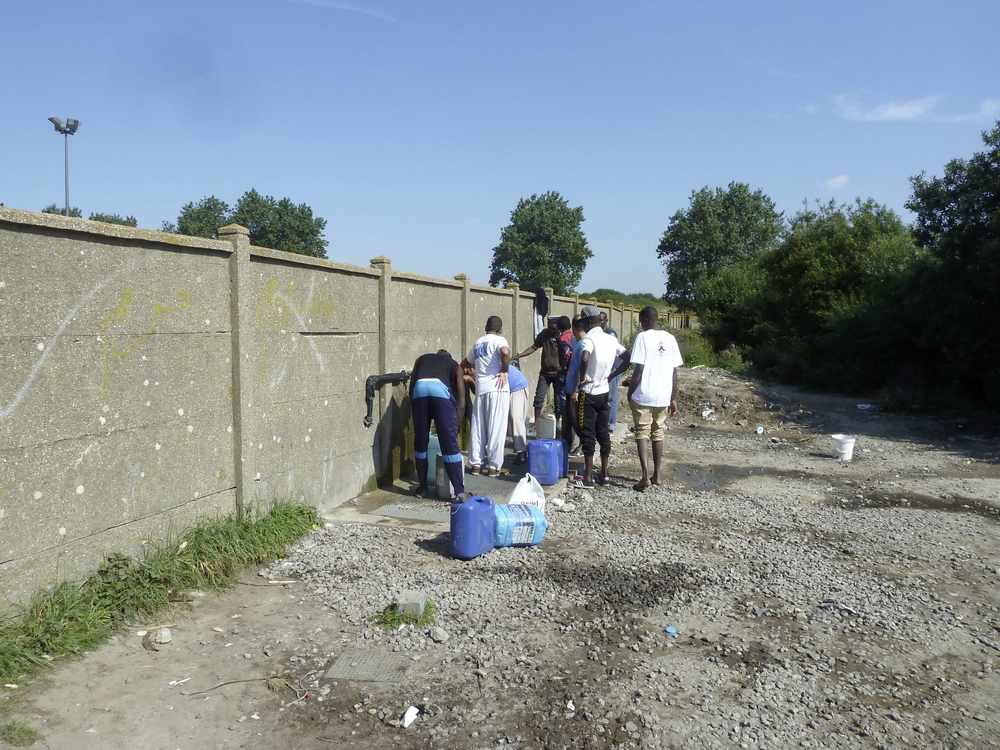
[figure caption=”Jersey Aero Club member Kat Tiefenthal got her pilot’s licence six years ago. She and other amateur pilots have to spend a certain number of hours flying each year either for training or to retain their licence.
When Kat read about the Jersey Calais Refugee Aid Group’s work in the JEP, she recognised that there was an opportunity for her to do her part to help.
‘I saw the story in the JEP and I thought that as Calais is not that far away I could help out by taking stuff over there, so I got in contact with Sophie,’ she said.
‘I have to do a certain amount of hours in the air each year, so I have to fly somewhere anyway.
‘Their (Bram and Sophie) next trip was not until 18 September, and the supplies needed to be taken as soon a possible – I told her we could do some flights much sooner.
‘There are about five or six pilots at the Aeroclub who would also be willing to do flights – they need to do their hours and are making flights anyway.’
Sophie Renouard set up JCRAG last month with her husband Bram, and has been making contacts ‘on the ground’ as the couple work to help provide relief to Calais.
They have formed links with organisations in France who are helping the migrants in the Jungle.
Sophie feels that the network that she and her husband have formed will now prove invaluable in providing a relief effort from Jersey.
She said: ‘The Jersey Calais Refugee Aid Group has made contacts on the ground and the best thing to do would be to channel donations through JCRAG.
‘People are being very kind – going through their attics and saying I could take that to Calais, but it needs to be co-ordinated.’
She pointed out that aid needed to be distributed carefully and the best people to do so were agencies already working in the areas such as Auberge des Migrants and Secours Catholique
Sophie also said she was overwhelmed by the generosity of the people of Jersey following JCRAG’s appeal and wanted the momentum to continue.
She said: ‘We need to raise funds so they can buy fuel for the winter and I want to keep up the good effort with donations of food. If people can provide food like canned sardines or tinned food, then we can give that to them. There is a list on our web page of the types of food that are needed.’” title=”10654964″ align=”center” url=”/?attachment_id=1510509″ id=”1510509″ size=”100″]
[figure caption=”Gasim from Darfur: ‘I left Darfur because of the war there. I want to move to any country where I can be safe. I came from Libya and went to Italy before I came to France.
I came by ship across the Mediterranean. I left my family behind and came on my own to Europe. It was too difficult to take my family with me. In Libya it is very dangerous because they have a war there also. And also the ship from Libya to Italy was very dangerous – I didn’t want to take my family with me on that. I spent 13 days on the sea getting to Italy.
‘I say ”thank you” to all the people from the UK, from Germany, from Belgium who have come to help us here. They have helped the people but we don’t need food or clothes anymore – we need insulation. When the winter comes it will get very cold and it will be very difficult for us here.
‘We want to continue our lives. We want to get papers to get in anywhere – the UK, Germany, France, any place. And we want to bring our family with us, so they can live with us.
‘I have been in Calais since October last year – so almost a year now. Back in Sudan I made shoes for ladies. If I could do that over here than I would.’” title=”10654974″ align=”center” url=”/?attachment_id=1510371″ id=”1510371″ size=”100″]
[figure caption=”Yousef from Kuwait: ‘I have been here six months in France and I am trying to reach the UK. Kuwait has no schools, no hospitals. No anything and no work. I like the UK – I think life will be good there.
‘From Kuwait I came straight to France – I didn’t come through Iraq. I paid $7,000 to get to France. It cost so much because I needed to get a passport to come here. I don’t know where the person I bought the passport from came from – maybe France, maybe Germany.
‘My father is in England and my sister and mother are back in Kuwait. It was too much money to bring them here.
‘I just need to go to England because it is so good – the schools and hospitals.
I don’t know what I will do when I get there. I did not have a job in Kuwait. I would like to work in England. Maybe the people from Kuwait could drive or work in shops when they get to England.’” title=”10654980″ align=”center” url=”/?attachment_id=1510377″ id=”1510377″ size=”100″]
[figure caption=”Jambo from Eritrea: ‘I left Eritrea because it has no freedom and because of the fighting. Every day people are dying.
‘I want to go to England because I want my family to live in Manchester. My mother says she wants to live in England.
‘I came to France from Eritrea illegally. I paid money to a smuggler in Libya to take me across the Mediterranean.
‘It cost me 6,000 euros for each of my family to come here. When I get to England I want there to be no problems for my family.
‘We won’t have any problems with eating. England is the best because of the freedom.’” title=”10654992″ align=”center” url=”/?attachment_id=1510385″ id=”1510385″ size=”100″]






